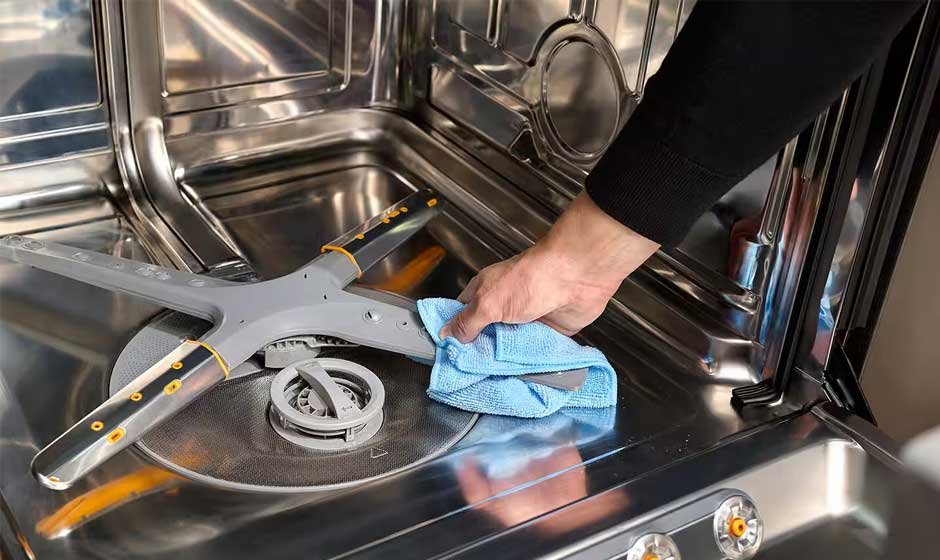Life in a rental comes with its perks, including often having a brand-new dishwasher.
However, cleaning and maintaining it can quickly become a nagging issue, requiring frequent maintenance and potential bond concerns with your landlord.
So, a little care now and then can save you a lot of hassle. Here’s how to keep the appliance perfectly clean, efficient, and problem-free—exactly the way you want it.
Check the Manual for Specific Instructions
If you’ve ever stared at your dishwasher’s buttons, wondering what half of them actually do, you’re not alone. Every model has its own unique way of working, and the manual is the key to understanding it.
It explains which cycles are best suited for different loads, how often to clean the filter, and which detergent or rinse aid yields the best results. You could even discover energy-saving settings or maintenance tips you didn’t know existed.
Reading through it can save you from cloudy glasses, bad odours, or that dreaded moment when you have to call your landlord about another appliance issue.
Adhering to your manual also keeps your warranty valid, so if you break the rules, it’s possible that you may lose that coverage. If that happens, small problems can become expensive ones.
It’s okay if the paperback version of the manual is long gone, as most manufacturers have digital versions available on their websites. Just open the dishwasher door, find the model number on the inner frame, and look it up online.
It’s a quick and easy way to get familiar with your dishwasher and keep it running like new.
Clean the Filter Regularly
If you’ve just opened the dishwasher after a full cycle, only to find food bits still stuck to your plates, it’s a sign that your filter is probably overdue for a clean.
It works hard behind the scenes, catching crumbs and grease so the water can circulate properly. But when it’s clogged, everything slows down—your dishwasher has to work harder, and the results start to show.
You’ll find the filter sitting at the bottom of the machine, usually under the spray arm. Just twist or lift it out, depending on your model, and rinse it under warm running water.
A soft brush or an old toothbrush helps remove anything stubborn. Once it’s clean, slot it back in securely, and you’re good to go.
Aim to do this about once a month, or a little more often if you use your dishwasher daily. This small habit keeps your dishes cleaner, your machine more efficient, and your kitchen running quite smoothly.
You can also leave the job to a professional cleaning service. They can properly deep-clean your dishwasher and ensure every part works as it should.
Besides, it’s definitely worth booking them if it’s time to move out—many offer end of tenancy cleaning services that cover all your rental appliances. This can be really useful in helping you leave the place spotless and giving you a much better chance of getting your full bond back.
Wipe Down the Door and Gasket
These components might not seem like the most important parts of your dishwasher, but they play a crucial role in keeping everything clean and perfectly sealed.
Over time, moisture, soap residue, and bits of grime can accumulate around the edges, creating an ideal environment for mould and unpleasant smells to develop. If you’ve ever opened your dishwasher and caught a musty scent, this is usually where it’s coming from.
Cleaning them is quick and easy. Start by using a soft cloth or sponge with a bit of mild detergent and warm water to wipe around the inside of the door, the hinges, and the rubber seal.
Ensure you reach into the small folds of the gasket, where dirt often accumulates. Once everything looks clean, wipe it down again with a damp cloth. Remember to leave the door slightly open for a while so the interior can air out properly.
Try to make this a weekly habit, especially if you use your dishwasher often. As part of your cleaning routine, take a moment to check the gasket for any cracks or areas where it’s starting to wear out, as these can lead to leaks later on.
Run a Hot Water Cycle
If you’re looking for a natural solution to sanitise your machine, white vinegar is your best bet since it reaches deep inside and flushes out all gunk. Place a cup of it on the top rack and run the hottest cycle available.
This removes limescale and unpleasant odours by breaking down soap scum and food debris that are stuck inside. It’s inexpensive and effective, so do this once a month.
After this cycle is done, run another with just water to rinse everything out. Your dishes will come out cleaner, and the machine itself won’t smell bad anymore!
Check the Spray Arms
Keeping the spray arms is vital for having spotless cutlery, glassware, and plates.
These components distribute water evenly throughout washing cycles. So, examine them periodically for accumulated debris or blockages.
Depending on the model you have, they can be either unscrewed or simply twisted out of the mechanism.
Aim to do this every couple of months. Sure, it takes time, but consistent maintenance keeps your machine running smoothly, speeds up wash cycles, conserves power, and reduces water usage.
Descale the Mechanical Parts
Proper dishwasher care is particularly important in areas with mineral-rich water, commonly known as hard water.
These minerals accumulate within machines, reducing their efficiency and potentially increasing energy costs. To maintain optimal performance, use specialised descaling products designed for dishwashers or choose citric acid as a natural alternative.
Simply add the product and run a complete cycle every three to six months following package directions.
Regular descaling helps keep mineral buildup in check, allowing your dishwasher to run like new. It also reduces the risk of costly repairs and lowers energy consumption. It’s a simple habit that makes a big difference and is generally a key part of smart home management.
Use Safe Cleaning Tools
Soft sponges and cloths work best for cleaning dishwashers. They get things clean without scratching surfaces. Silicone sponges are also effective, as are microfibre cloths.
On the other hand, avoid using steel wool or rough scrubbers, as they can damage the plastic parts inside. The same applies to those harsh chemicals—they can damage seals and cause leaks. For most purposes, stick to mild soap and warm water.
Also, don’t cut corners because decent tools last longer. Cheap ones fall apart quickly and don’t clean as well.
Conclusion
As you can see, taking care of your dishwasher isn’t complicated. All it takes is regular cleaning to ensure everything works smoothly.
This way, your machine takes care of business while you enjoy a problem-free stay in your rental, without having to worry about losing your bond or warranty.



